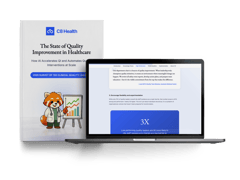
Adopting Data-Driven Insights to Enhance Patient Care
For decades, healthcare has relied on a doctor's intuition and experience to guide patient care. While this approach has its merits, it often overlooks the unique needs of each individual. Imagine a patient being treated for a condition based on averages, not a specific medical history or lifestyle.
What if we could leverage a goldmine of hidden patient information to personalize healthcare?
By embracing data-driven insights, medical professionals can move beyond guesswork. This approach holds the power to revolutionize healthcare, leading to better outcomes, fewer errors, and a more empowered patient experience.
Meet the Expert
Mical DeBrow is an accomplished healthcare leader and clinician with extensive expertise spanning pharma, healthcare payers and providers, and healthcare information technology.
4 Ways Data Can Improve Patient Care
Traditionally, medicine mainly relied on a doctor's experience and intuition. While these qualities are still necessary, the rise of electronic health records (EHRs) is creating a data-driven era in healthcare. Here's how:
1. Population Insights
Analyzing large datasets of medical records from across entire populations can help identify geographical patterns of disease progression and track mutation rates in viruses.
It can also improve understanding of how socioeconomic factors influence treatment effectiveness for different demographics. This knowledge can guide research and development towards more targeted and effective treatments.
» Learn the best ways to keep your staff healthy and productive
2. Personalized Medicine
By analyzing a patient's unique genetic makeup, medical history, and response to past treatments, doctors can create personalized plans.
The data-driven approach can improve treatment effectiveness, such as by increasing remission rates in cancer patients or reducing the dosage needed for medications. It can also minimize side effects like nausea or fatigue.
3. Fewer Mistakes
Data analysis can pinpoint inefficiencies in healthcare workflows. By identifying areas for improvement, clinicians can reduce errors and speed up diagnoses. The effect is a smoother patient experience, meaning shorter wait times and less frustration.
4. Early Intervention
You can use data analysis to compare the effectiveness of different treatments for the same condition. This information can help doctors make more informed decisions, improving patient outcomes.
Different tools can also identify potential health risks or complications earlier, enabling preventative measures and potentially catching and treating issues before they progress.
For example, predictive analytics can forecast peaks in flu season and high-risk outbreak zones based on travel patterns and population density. They enable interventions like sending vaccines or educational resources to high-risk areas.
» Want to use AI in healthcare? Find out how innovation is improving patient care
Tips for Embracing A Data-Driven Approach
One of the biggest challenges when implementing data-driven healthcare is addressing clinician concerns. Some staff members might feel threatened by new algorithms, fearing technology could replace them.
Here's how to address this concern:
Focus on Collaboration
- Frame Data as an Ally: Communicate that data analysis is meant to augment, not replace, clinical expertise. Data provides valuable insights to complement a clinician's experience, leading to more informed decisions.
- Empower Clinicians: Involve staff in the selection and implementation of data-driven tools. Platforms like C8 Health can further empower clinicians by providing a central hub for accessing and sharing best practices, facilitating collaboration across care teams
- Prioritize User-Friendly Interfaces: Ensure data systems are designed with clinicians in mind. They should be intuitive, integrate easily into existing workflows, and reduce administrative hassles.
Embracing knowledge management platforms is an easy way to accomplish these goals, yet countless healthcare organizations struggle to do so. Download our latest white paper to learn why that's a problem and the steps you can take to address it.
Highlight the Benefits for Everyone
Emphasize how data helps clinicians deliver personalized care. For example, analyzing a patient's unique medical history, genetic makeup, and response to past treatments allows for tailored treatment plans, ultimately leading to better outcomes.
You can also share real-world examples of how data analysis has improved patient care in other healthcare institutions. This can help build confidence and enthusiasm for the new approach.
It's a Journey, Not a Destination
To help staff feel comfortable using data-driven tools effectively, provide ongoing training and support. Focus on encouraging open communication and feedback from clinicians on the systems being used. It'll lead to continuous improvement and ensure the tools remain relevant and supportive.
The Long-Term Value of Data-Driven Healthcare
While implementing data-driven healthcare requires an upfront investment, the long-term benefits significantly outweigh the initial costs.
-
Improved Outcomes: Effective, personalized treatment reduces readmission rates and healthcare costs. This could result in higher reimbursements from insurance companies.
-
Reduced Costs: Data analysis can identify inefficiencies in hospital workflows and processes. By streamlining operations and minimizing waste, data can lead to significant cost savings.
-
Boosted Reputation: Being known for delivering exceptional, data-driven care attracts top medical professionals and patients wanting the best possible outcomes. This cycle strengthens the institution's long-term financial health.
Beyond Data: The Power of the Human Element
While data plays a valuable role in healthcare, it can't replace the nuances of the human experience. Clinicians who actively listen to their patients gain invaluable insights that lead to more effective and personalized care. This connection fosters trust and improves the outcomes.
In a world driven by data, C8 Health streamlines workflows for clinicians, freeing up time for personalized patient interactions. This encourages a deeper understanding of patient needs and concerns, leading to more informed decisions and better outcomes.

Access Clinical Resources: Unite your department's knowledge on any device.
Manage Your Knowledge: Easily create, maintain, and update clinical resources.
Integrate Your Workflows: Deliver content directly to the point-of-care.
Collaborate and Communicate: Share knowledge and communicate across medical institutions.
Analyze Your Data: Track clinician engagement with custom insights.


